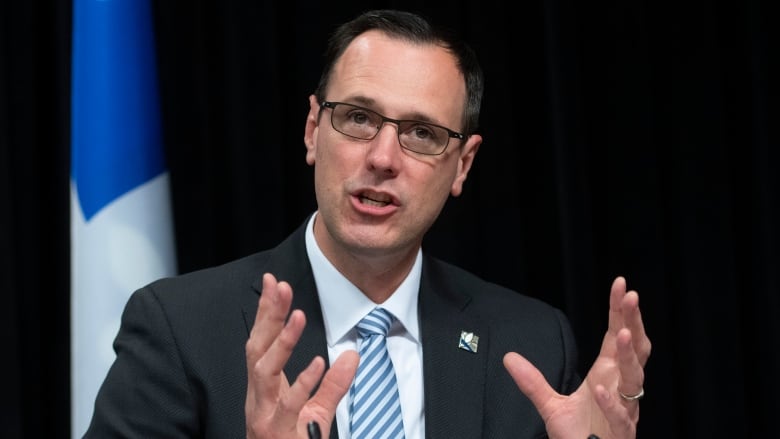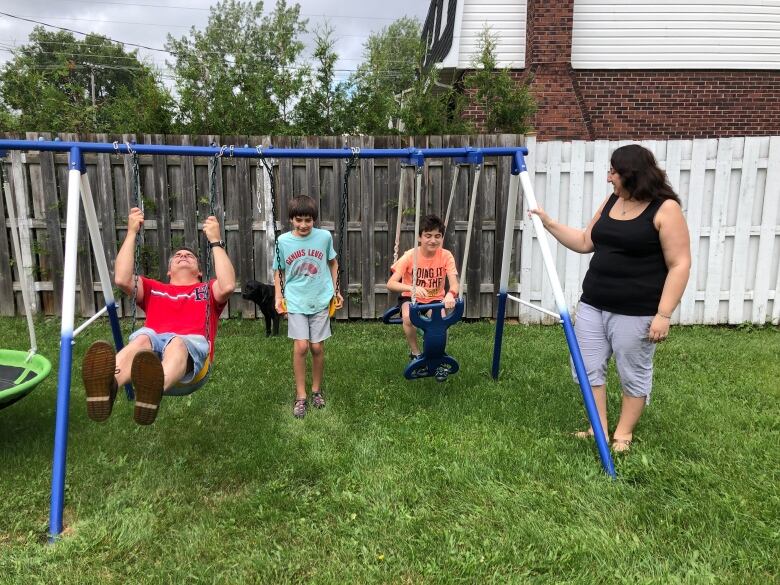Quebec is spending $20M to make up for time lost by students, especially those with learning disabilities
Plan aims to help vulnerable children make up for time lost during lockdown

Ever since Quebec schools shut down suddenly in mid-March, parents have been wondering how children are supposed to catch up.
Distance-learning was slow to start and patchy at times, depending on the school and what equipment students had.
The government too has been slow to respond to parents' complaints, but today with the start of the new school year less than two weeks away Education Minister Jean-Franois Roberge launched a three-pronged plan to make up for time lost.
Still, it's not clear that his plans will be enoughto reassure parents or teachers, who have trepidations about the upcoming school year.
All students, except those who are at risk of developing complications from COVID-19, or who have a family member who is, are expected to return to school later this month under the government's regulations.
Under Roberge's plan, Quebec will provide schools with $20 million to hire specialized educators and teachers to help students catch up on what they might have missed in particular, those with learning disabilities or difficulties such as dyslexia, autism spectrum disorder and ADHD.
"Those who were already vulnerable might have suffered more in a different learning environment," Roberge said.
But he added thesum is a one-time only payment, for the current fiscal year.
Roberge saysthemoney will be used to hire new employees andto improve the contracts of special education technicians who currently work part-time.
"It will allow them to give more time to the students they have to assist, and to follow other students," Roberge said.
Heidi Yetman, president of the Quebec Provincial Association of Teachers, said the announcement is a step in the right direction, but the $20-million investment is not nearly enough to help students in need.
"I really doubt that it's going to make a huge impact on students who need the extra help," Yetman said. "And we have students who have been missing out on school for quite a long time on top of it."
Yetman had also hoped there would be some money invested in infrastructure to protect students from COVID-19, such as better ventilation systems. That might have gone a long way to reassuring parents who are nervous about pupils heading back into classrooms.
Walking a tightrope
Lynda Kachaami has two children with special needs:Gabriel, 12, is on the autism spectrum, and Alex, 9, has muscular dystrophy.
Gabriel's autism makes virtual learning difficult for him. He needs one-on-one contact, and with a teacher wearing a mask, it will be difficult for him to engage and read facial expressions, Kachaami says.

At the same time, Alex's muscular dystrophy means he is immunocompromised, making school a potentially risky place for him.
His parents are waiting for a doctor's recommendation to find out if he will be exempt from going back to school and if that means his brother will have to stay home.
"This is the tightrope that we have to walk," Kachaami said. "If you choose for the benefit of one, the other one will be suffering in some way."
She says there's no perfect solution, and she is waiting to see how the government's plans will play out at her children's schools.
Publicity campaign
A second measure is meant to reduce bureaucracy in the school system over the next two years, which Roberge says will free up time to devote direct services to vulnerable students.
And the third measure is the launch of an information campaign to promote school attendance and the return to school.
"A lot of students have lost three and a half months of schooling in presence live schooling," said gide Royer, a psychologist in charge of the campaign. "We will need to do some kind of remedial work."
A recent online survey of 1,000 Quebecers conducted on behalf of the Centrale des syndicats du Qubec, an umbrella labour organization that includes unions representing teachers, professors and other educational staff, suggests that a majority of Quebecers are worried about the impact of the pandemic on students, in particular those with learning disabilities.
Last Monday, Roberge presented a revised back-to-school plan.
Under the new rules, wearing a mask will be compulsory outside the classroom for students Grade 5 and older. Bubbles have also been expanded to include whole classes, meaning students in the same room will not have to remain physically distant from each other.
Some parents are concerned that they don't have the option to continue distance-learning online at home, like in Ontario. Although they have the option of homeschooling, parents often need to work to support their families.
"We need to have teachers teach our students," said Katherine Korakakis, president of the English Parents' Committee Association. "When you're homeschooling, the onus is on the parent, which becomes difficult."
She's hoping English school boards will take the government funds and put in measures that "fit our community needs."
With files from CBC Montreal Daybreak













_(720p).jpg)


 OFFICIAL HD MUSIC VIDEO.jpg)
.jpg)



























































































